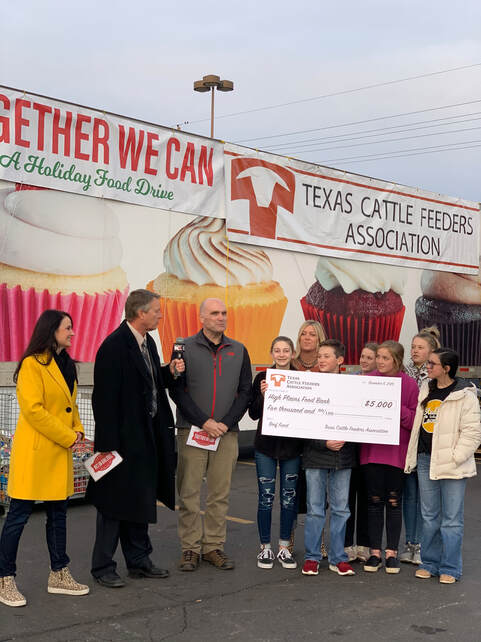 Thanks to the support of the entire local beef community, including TCFA members and local packing plants, the industry was able to raise over 200,000 pounds of ground beef for the High Plains Food Bank (HPFB) in 2019. In addition to pounds raised, collectively, TCFA members donated over $10,000 to the HPFB Beef Fund. Wayne Craig, TCFA Industry Relations committee chair, along with students from Bushland, announced the total at the Together We Can High Plains Food Bank Food Drive televised event earlier this month. While the televised event has come and gone for 2019, there is still opportunity to support those facing food insecurity in our area. In fact, our local Wells Fargo Bank is matching donations up to $25,000 with a $5,000 per donation cap. There are multiple ways to donate and have your dollar matched.
Based on the account holder’s zip code, the donation will be directed to the local food bank! You can also donate directly to the HPFB Beef Fund. TCFA would like to thank all the organizations and individuals who diligently give year-after-year to folks in need. Thank you for all that you do for our local communities.
0 Comments
Legislation to codify the definition of beef and uphold truthful labeling on alternative protein products has now been introduced in both chambers of Congress. On Wednesday, Sen. Deb Fischer of Nebraska introduced the Real MEAT (Marketing Edible Artificials Truthfully) Act as a companion bill to H.R. 4881, which was introduced in the House of Representatives in October.
"Consumers want to know what is in their food, and rightfully so," said Paul Defoor, TCFA chairman. "There are a number of fake products on the market that claim to be meat, when in fact, they are the furthest thing from real meat. "Americans love beef, so it's not surprising that fake products would try to ride the coattails of beef's popularity, but consumers deserve more than deceptive labels. They should be confident that, when they buy a product labeled meat, it's actually meat. Furthermore, food labels should be honest and accurate, and these bills will ensure that consumers have the right information to make their own decisions." The bills would establish a federal definition of beef that applies to food labels. They also preserve the congressional intent of the Beef Promotion and Research Act that was signed into law as part of the 1985 Farm Bill. Section (3) of that bill clearly defined the terms "beef" and "beef products," and although these terms were codified in 1985, they don't apply for labeling purposes. The Real MEAT Act would fix that. Second, the bills affirm the misbranding provisions that are already on the books. These provisions were put in place over 50 years ago to prevent consumer confusion, and that intent has not changed. Third, the bills strengthen enforcement of mislabeling laws. Currently FDA, the agency that oversees plant-based proteins, does not enforce mislabeling until a product has already come to market. This is, in-part, because FDA does not require the approval of labels on foods under their jurisdiction before they hit the shelves. The Real MEAT Act would change that by requiring FDA to notify USDA, in writing, when they determine a product is mislabeled. If FDA does not take enforcement action within 30 days, the Secretary of Agriculture can step in and take action. “Beef is derived from cattle — period," Senator Fischer said. "Under USDA, beef undergoes a rigorous inspection and labeling process, but plant-based protein products that mimic beef and are sometimes labeled as beef are overseen by the FDA instead. These products are not held to the same food safety and labeling standards as beef. The NCBA has been a leader on this issue, and I am thankful for their strong support of the Real MEAT Act, which will protect consumers from deceptive marketing practices and bring transparency to the grocery store." Fisher wrote about the motivation behind the bill in Wednesday's Wall Street Journal. Thank you Sen. Fischer. We could not agree more. |
Categories
All
Archives
June 2024
|
About TCFA |
Get Involved |
|

